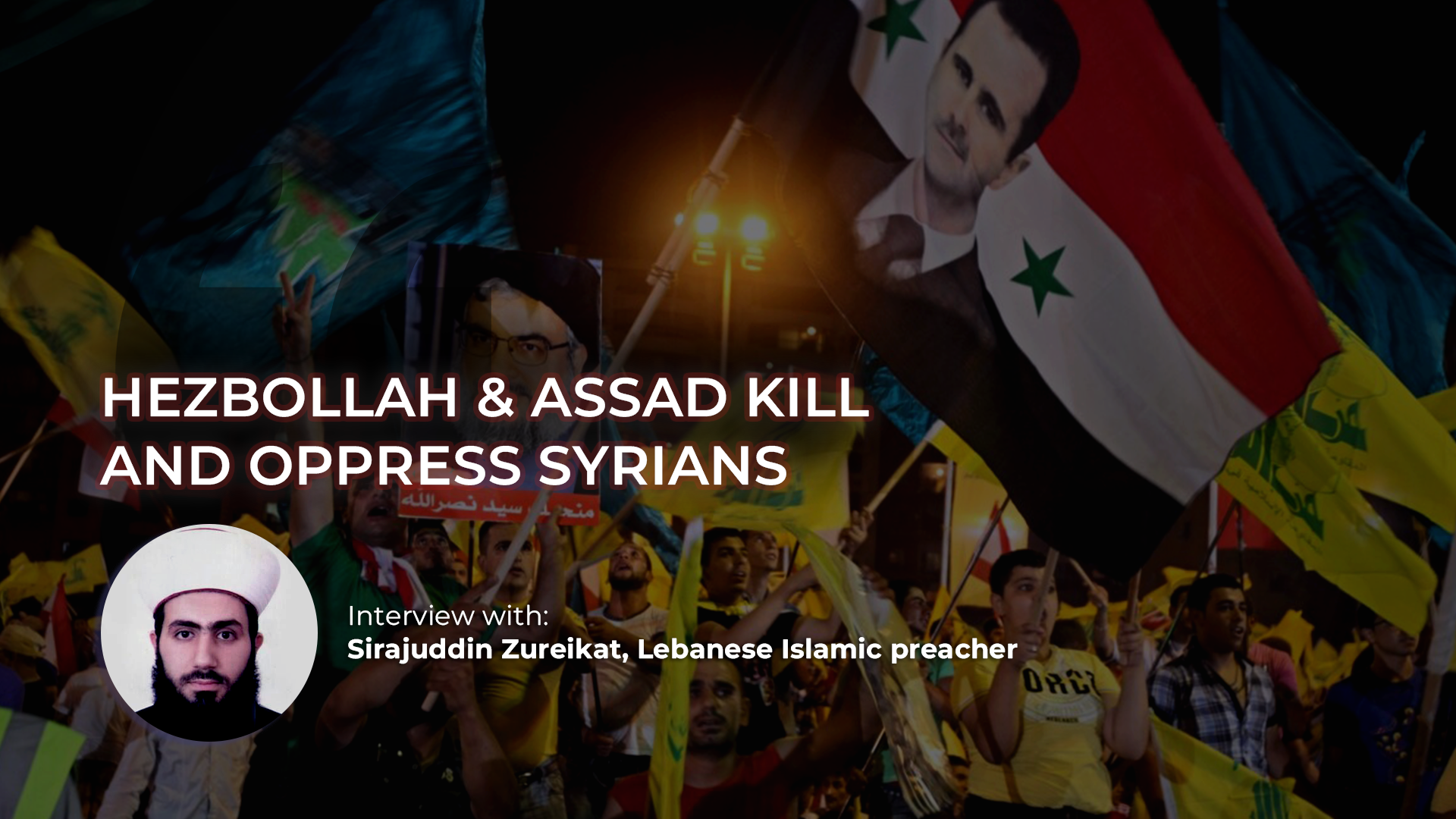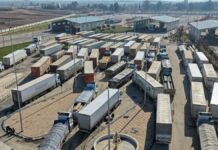
In this interview with L24, Sheikh Sirajuddin Zureikat, an Imam and preacher from Beirut, discusses his motivations for relocating to Syria and the broader political and religious challenges faced by Lebanon and the region. He offers insights into his work with Syrian revolutionaries, his perspective on Hezbollah’s involvement in both Lebanon and Syria, and the impact of Iranian influence.
L24: What is the reason for your relocation to Syria? Could you tell us more about your work, whether it is educational, religious, or social?
“Praise be to Allah, and peace and blessings be upon the Messenger of Allah. To begin, I introduce myself: I am the humble servant of Allah, Sirajuddin Zureikat, from Beirut, an Imam and preacher in its mosques.
“I went to Syria in 2012 for two main reasons: the first being the security crackdown on preachers, scholars, and anyone who opposed Hezbollah’s policy in Lebanon, and before that, anyone who opposed Syrian intelligence policy. Hezbollah’s attacks on us in Lebanon have not ceased over the past two decades, such as the Hezbollah assault on Beirut on May 7, 2008, and the events at Abra Mosque in Sidon in 2013, among others. The Assad regime and its ally Hezbollah have pursued a policy of assassination and killing of opponents, including politicians, security personnel, and journalists, for 30 years.
“The second reason is to offer what I can to my Syrian brothers in their revolution against the criminal Assad regime, which we suffered from in Lebanon for decades. How can we remain on the borders of our oppressed and tortured people in Syria, witnessing massacres, assaults on dignity, and the killing of children without doing anything? As for my work in Syria, it focuses on preaching and guiding the fighters and revolutionaries, particularly in the liberated areas, based on my academic studies.”
L24: How do you see the current situation in Lebanon, especially regarding the ongoing conflict? In your view, what are the root causes of the unrest in Lebanon, and how do you see these situations evolving?
“Hezbollah in Lebanon is currently facing an unprecedented Zionist attack, as it is Iran’s strongest tool in the region. Hezbollah has turned Lebanon into a defensive line for Iran and its project, and today, the Lebanese are paying a high price with their lives and property while Iran does nothing to support them! Instead, Iran sacrifices Hezbollah and other Arab Shiites as offerings for its agreements with the West.
“The continuous unrest in Lebanon is directly due to Hezbollah’s dominance over the state, significantly obstructing its decisions whenever they contradict its internal and external policies. Hezbollah has carried out dozens of assassinations in Lebanon over the years to eliminate its opponents and critics, including politicians, security figures, and journalists – most notably Rafic Hariri, Wissam al-Hassan, Samir Kassir, and Pierre Gemayel.

“It has also worked diligently to weaken Islamic groups in Lebanon, restrict their activities, and prevent them from any form of growth and strength, continuing the Assad regime’s approach since its entry into Lebanon, inflicting massacres and destruction on Sunni communities in Tripoli, Beirut, Sidon, and other areas.
This oppressive approach was not limited to the Sunnis but extended to other sects, such as Christians, Druze, and even dissenting Shiites.”
L24: What is your opinion on Hezbollah’s involvement in the Syrian conflict? How do you assess their role, both militarily and religiously, and its impact on the region?
“Firstly, it is important to clarify that Hezbollah had its bases, camps, and presence in Syria before the revolution, meaning before 2011. Its participation alongside the criminal Assad regime in suppressing the Syrian revolution began in the Homs countryside, particularly in the al-Qusayr area in June 2011.
“Later, it fought in the battles of Baba Amr, Zabadani, and Aleppo in 2012. Hezbollah played a major role in reinforcing the criminal Baathist regime and suppressing the Syrian people’s revolution. According to Baathist regime officials, Hezbollah was the largest military force in the field fighting against revolutionary factions. It was involved in bombing and besieging many areas, including al-Qusayr, Qalamoun, Zabadani, Madaya, Ghouta, Aleppo, Daraa, and even Palestinian camps, despite their claims of supporting Palestine and its people.”
“This is the correct historical context of Hezbollah’s role in Syria, not the false narrative that they entered to confront extremists like ISIS. Where was ISIS in 2011?! Hezbollah sided with the oppressive tyrant and stood against the Syrian people, the same people who hosted the residents of Beirut’s southern suburbs and those of the south and the Bekaa during the 2006 Israeli aggression on Lebanon. In response, Hezbollah repaid the Syrians’ hospitality with killing, displacement, siege, and starvation. Today, it continues to actively participate with the Assad regime in oppressing and killing Syrians.”
L24: Some have accused the Syrian people of celebrating Nasrallah’s death. How do you respond to these criticisms? What is your stance on how a Muslim should react in such situations, and how do you address these accusations?
“The Syrian’s joy and that of other Muslim communities at the death of the criminal tyrant Hassan Nasrallah is due to his role in killing and oppressing them, and his aiding the tyrant of Damascus in their suffering. How could Syrians not rejoice at the demise of someone who oppressed them, killed them, terrorized their children, and imprisoned their loved ones?

“This joy is the joy of the oppressed who see Allah’s response to their prayers and His just retribution against their oppressor. This happiness does not imply support for the Zionists or alignment with them. Those who know the people of the Levant understand that they stand with their brothers in Gaza and support them in any way they can.”
L24: Why do you believe that an alliance with Iran is a mistake? What are the religious or political reasons that make you oppose such alliances, especially from an Islamic perspective?
“Iran is a hostile and belligerent state that has participated directly, especially through the so-called Revolutionary Guard, in killing Muslims and suppressing their revolutions in Syria, Iraq, and Yemen. It has also contributed to the oppression, killing, and humiliation of Muslims in Lebanon through its proxies, Hezbollah and the Amal Movement. Any alliance with criminals is a betrayal of Islam, Muslims, and the blood of martyrs, as well as the sacrifices of our Arab and Islamic countries, which have suffered from Iran’s aggression for years.

“Iran poses a threat to all countries in the region, whether in the Levant or the Gulf. The energies of the Ummah should be mobilized to confront this danger. This does not mean, however, that we neglect the threat posed by the Zionists and their expansionist project in the region.”
L24: Why do many refugees from areas under regime control choose to come to northern Syria instead of staying in regime-controlled areas? What factors drive this displacement, and how do you see this issue from a humanitarian and political perspective?
“Refugees seek safety, which they do not find in areas controlled by the criminal regime. These regions are overrun with drug and theft gangs, making them unsafe for civilians. As a result, most Syrian refugees from Lebanon head directly to the liberated areas, fully aware of the regime’s treachery and oppression. They know there is no safety for them in the regime’s territories.
Many refugees have been deceived by the regime’s ‘embrace of the homeland’ narrative, only to find themselves imprisoned in Assad’s dungeons or handed over to Iranian militias.”








